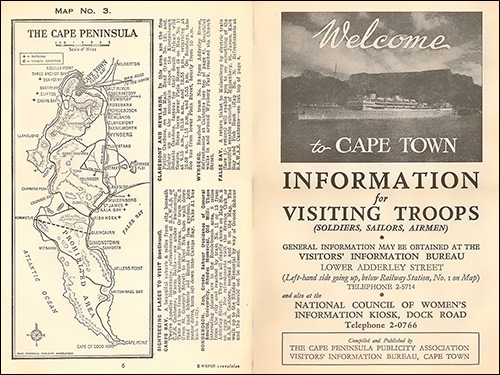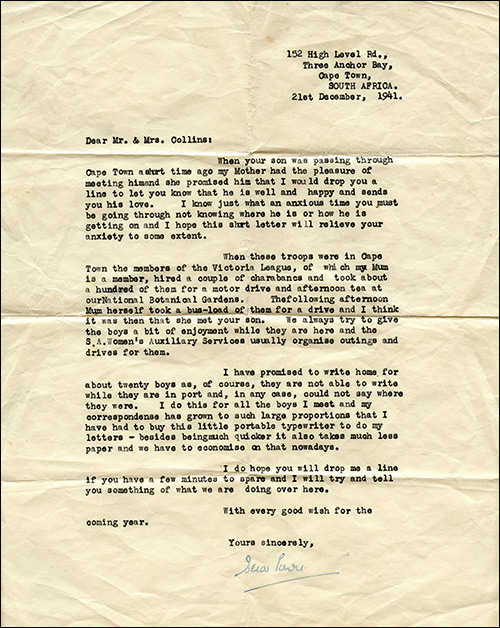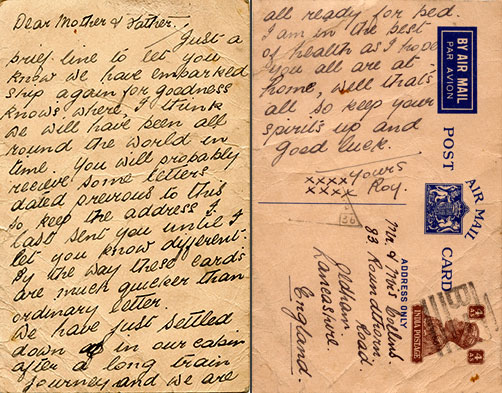

Arrival at Cape Town
The approach to Cape Town must have been a welcome sight and provided much needed relief to the thousands of troops who had spent almost a month on board ship and circled half way round the globe.
Not many hours after docking on 9th December 1941, the men were granted shore leave. Roy recalled:
"It was a wonderful sight seeing the Table mountain as we arrived in Cape Town. We couldn't believe there was still war on, nothing was rationed and almost everything we wanted was available, sweets, English cigarettes, chocolate and most of the entertainment was free. The local people made us so welcome and went out of their way to make our stay enjoyable."
As the troops went ashore they were greeted by queues of locals handing out 'Welcome' leaflets and offering hospitality or sight seeing trips. Some took the soldiers to their homes for a meal and others were taken to cafes and places of entertainment. Many of the men were quite overwhelmed by the welcome they received.

Leaflet handed to troops - Welcome to Cape Town
Even though shore leave had been granted, training for the troops continued and they were organised into patrols and marched around the various districts of Cape Town. Some of the routes passed through the black shanty towns and for a majority of the men it was their first experience of apartheid.
On one of the days during Roy's stay in Cape Town he was taken on a sightseeing tour organised by members of the Victoria League. The ladies of this society took around a hundred troops for a tour followed by afternoon tea. One of the ladies Roy met promised to write home for as many of the troops as possible to let their next of kin know they were safe and well.
Shortly after the troops had left Cape Town she fulfilled her promise.

Letter from Cape Town to Roy’s Mother & Father
The letter from Cape Town reads:
"When your son was passing through Cape Town a short time ago my Mother had the pleasure of meeting him and she promised him that I would drop you a line to let you know that he is well and happy and sends you his love. I know just what an anxious time you must be going through not knowing where he is or how he is getting on and I hope this letter will relieve your anxiety to some extent.
When these troops were in Cape Town the members of the Victoria League, of which my mum is a member, hired a couple of charabancs and took about a hundred of them for a motor drive and afternoon tea at our National Botanical Gardens. The following afternoon mum herself took a bus-load of them for a drive and I think it was then that she met your son. We always try to give the boys a bit of enjoyment while they are here and the S.A. Auxiliary Services usually organise outings and drives for them.
I have promised to write home for about twenty boys as, of course, they are not able to write while they are in port and, in any case, could not say where they were. I do this for all the boys I meet and my correspondence has grown to such large proportions that I have had to buy this little portable typewriter to do my letters - besides being much quicker it also takes much less paper and we have to economise on that nowadays.
I do hope you will drop me a line if you have a few minutes to spare and I will try and tell you something of what we are doing over here.
With every good wish for the coming year, yours sincerely Elia Power "
I don't know how long it took for the letter to reach England but it must have been a great relief and somewhat of a surprise for Roy's Mum and Dad to receive a letter from South Africa.
During the time of the convoy's stay in Cape Town, news was received of the sinking of the battleship HMS Prince of Wales and battlecruiser HMS Repulse by the Imperial Japanese Navy off the coast of Malaya on the 10th December 1941.
Three days earlier on 7th December 1941 (the same day as the attack on Pearl Harbour) the Japanese had begun an assault on British Territory in North Malaya. This was the start of a campaign inspired by the Emperor of Japan, Hirohito, to eradicate all sources of western {Imperialism} domination in the Asian sub continent. Lacking many natural resources, Japan planned to seize Burma. Malaya and Singapore and thus expand their empire in South East Asia.
The battleships Prince of Wales and Repulse had been heading north along the east coast of Malaya in response to reports of the Japanese landing troops at Kuantan. There (and lacking any air support) they were attacked and completely overwhelmed by Japanese torpedo bombers. Although eventually over 1000 survivors were rescued, this action resulted in the tragic loss of 840 sailors.
The sinking of these vessels left the allies severely depleted in the Pacific Theatre with only three operational capital ships remaining. This meant that the “impregnable fortress” of Singapore had effectively been reduced to a land base.
The 18th Division's stopover in South Africa was all too brief and on 13th December after hastily preparing for their onward journey the convoy sailed from Cape Town escorted by the battle cruiser HMS Dorsetshire and the six US destroyers. They rounded the Cape of Good Hope on the 14th December and as they turned northward for the Mozambique Channel the US destroyers left the convoy and headed back to Cape Town to prepare for other escort duties in the North Atlantic.
About a week after their departure from Cape Town the convoy split. The USS Orizaba was met by her escort HMS Ceres and they headed North to Mombassa, Kenya. Two days later the Mount Vernon also headed for Mombassa, arriving there on 25th December, while the remaining four troopships USS West Point, USS Wakefield, USS Leonard Wood and USS Joseph T Dickman continued to Bombay with their escort HMS Dorsetshire.
When Christmas day arrived, the troopships heading for Bombay were somewhere in the middle of the Indian Ocean. It was a time of mixed emotions for many of the men onboard as they were used to spending Christmas with their families and loved ones but the crews managed to organise entertainment and a special Christmas dinner was laid on to help the day along.
The convoy escorted by HMS Dorsetshire arrived at Bombay in the late afternoon of the 27th December . The USS Wakefield was the first to moor at Ballard pier where the troops disembarked soon after her arrival. The Westpoint, Leonard Wood and Joseph T Dickman followed over the next forty eight hours and by late on the 29th December all the troops were ashore.
A week later on January 6 at 1100 hours, Orizaba joined the troopships in Bombay and unloaded her troops. All the vessels now in Bombay were refuelled and restocked with provisions while awaiting further orders about their final destination.
The Mount Vernon did not pass through Bombay, instead she left Mombassa on the 29th December with HMS Emerald as escort to join with another convoy of merchant ships headed directly for Singapore via the Maldives and the Sundra Straits. General Percival, commanding forces in Singapore, had appealed for reinforcements and the 5th & 6th Royal Norfolks and the 2nd Cambridgeshire Regiment on board the Mount Vernon were chosen.
The situation in both the Middle East and the Far East was changing rapidly
Ahmadnagar
The troops were allowed one day's shore leave in Bombay before they were bound for either Ahmadnagar or Deollali. There was no warm welcome for the troops as there had been in Cape Town and for many of the men their stay was not such a memorable experience. The second day ashore Roy was in the group travelling to Ahmadnagar, a transit camp some 120 miles north east of Bombay.
Travelling by train, they arrived at Ahmadnagar on the 31st of December 1941. Roy remembered the journey:
"The day after we disembarked in India we travelled by train to a village called Ahemednaga. It was about 100 miles up country. We ended up in a barracks used by the Indian Army. The heat was almost unbearable, finding some shade was not always easy and everywhere was dry and dusty.
We spent a lot of our time on route marches and preparing for desert warfare. There were rumours that we were bound for Basra but no one really knew. Trying to get a good nights sleep was almost impossible because of all the flies and bed bugs biting. I had my share of bites but some of the men were covered in them from head to toe. We had to take our mattresses outside in the morning and beat them to shake out all the bugs and lice.
Every morning the first sounds we heard were the calls to the “Char Wallahs” to serve tea. Two locals used to appear from nowhere to serve up a cup of hot tea. It was very strong, not like what we had been used to back home. We also had a couple of "Dhobi Wallahs" - men who would collect our laundry and washing and bring it back clean the same day. Everything was cheap, for a few annas you could get anything from the locals.
We must have been there for about two weeks but it seemed much longer. We received our orders that we were moving out but we still didn't have any idea where we were going to."
While the troops were undergoing training at Deollali or Ahmadnaga the situation in Malaya was deteriorating rapidly. The troopship USS Mount Vernon had already set a course for Singapore but there was still deliberation at the War Office in England as to the ultimate destination of the remainder of the 18th Division. It was Churchill's view that the troops would be best deployed in Burma but the final decision was left to the newly appointed Commander-in-Chief of British troops in India, General Wavell. Wavell (who would later take charge of the South-West Pacific Command) decided that the division would make their way to Singapore.
Thus after a stay of just over two weeks the troops were ordered to return to Bombay where Roy and his comrades from the RAOC embarked the West Pointonce more. The USS West Point and her companion vessel USS Wakefield would now be part of a re formed Convoy BM11 along with troopships Duchess of Bedford, Empress of India and Empire Star. They were escorted (except for the two American transports), by HMS Caledon and HMS Glasgow. Between them they carried some 17,000 troops.
On the 19th January the convoy set sail and although their destination had still not been disclosed, it would not take long for the troops to work out that they were not headed for the Middle East. Although no one knew for certain, word soon spread that they were probably bound for Singapore.
Before leaving port in Bombay, Roy wrote a postcard to his Mother and Father :

Roy's postcard from Bombay
The message reads:
"Dear Mother & Father, Just a brief line to let you know we have embarked ship again for goodness knows where, I think we will have been all round the world in time. You will probably receive some letters dated previous to this so keep the address I last sent you until I let you know different. By the way these cards are much quicker than ordinary letter.
We have just settled down in our cabin after a long train journey and we are ready for bed. I am in the best of health as I hope you all are at home, well that's all so keep your spirits up and good luck, yours Roy"
